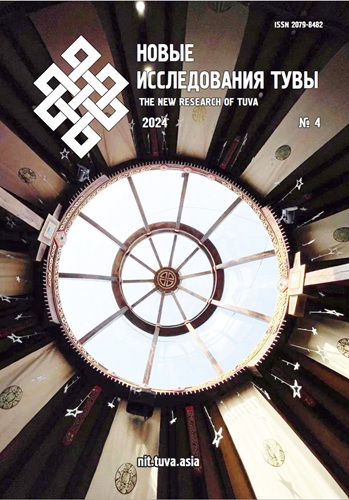Intellectual Discourse of Nationbuilding: Nationalism and History Writing in India
DOI:
https://doi.org/10.25178/nit.2024.4.20Keywords:
nation-building; nationalism; India; orientalism; hybridity; decolonialityAbstract
The article analyzes issues related to the intellectual discourse of nation-building in India, which is discussed in the context of theories of nationalism, the “third space” / hybridity and decoloniality. Using the works of Indian researchers devoted to the study of the ancient and modern history of India as a sample, the article defines and analyzes the main patterns associated with the actualization of these theoretical discourses.
It shows that the actualization of issues in the field of production of knowledge, meanings and values in India in relation to its ancient past and present went through certain stages, which reflected a change in paradigms — from orientalism through the “third space” to decoloniality. These stages became a reflection of the heated ideological discussions that took place and are taking place in Indian society. From a theoretical perspective, they are markers of the process of activating tradition in the “third space” and its transformation into decoloniality.
The historiographic narration of studying the history of archeology in the mid-20th century (Surindranath Roy) reveals the predominantly orientalist discourse and hybridity. In the late 20th — early 21st century, the research on archaeological issues at the junction with the socio-political analysis undertaken by Dilip Chakrabarty shows the preservation of hybridity and an appeal to decoloniality. At present, in the works of Sai Deepak, one can note the domination of the decoloniality concept over the other two discourses. Decoloniality occurs mainly through an appeal to tradition and religion, which becomes a key mode, both content and form, as well as a kind of engine of this process. In turn, this may indicate the long-term nature of the transformation process, the incompleteness of which could be clearly and particularly manifested precisely in the sphere of production of knowledge, meanings, and symbols.
References
Abylkhozhin, Zh. B. and Krupko, I. V. (2024) Ideological discussions and the search for the historical subjectivity of Kazakh society in the twentieth century. New Research of Tuva, no. 3, pp. 265–278 (In Russ.). DOI: https://doi.org/10.25178/nit.2024.3.15
Chetyrova, L. B. and Sakharov, A. S. (2023) Travelogues in the perspective of gender Orientalism (A case study of texts by K. D. Mintslova, E. K. Vereshchagina, S. R. Mintslov and Yu. N. Roerich). New Research of Tuva, no. 2, pp. 141–152. (In Russ.). DOI: https://doi.org/10.25178/nit.2023.2.10
Chetyrova, L. B. and Sergeeva, N. M. (2022) Soviet modernity in visual perspective: the cases of Kalmyks and Tuvans. New Research of Tuva, no. 2, pp. 239–262. (In Russ.). DOI: https://doi.org/10.25178/nit.2022.2.17
Chetyrova, L. B. and Sergeeva, N. M. (2023) Visual representation of the Oirat-Kalmyks and Tuvans in the context of power relations. New Research of Tuva, no. 3, pp. 171–192. (In Russ.). DOI: https://doi.org/10.25178/nit.2023.3.11
Ahmad, I. (1973) Caste and Social Stratification among Muslims in India. Columbia, South Asia Books; New Delhi, Manohar Book Service. 256 p.
Anderson, B. (1991) Imagined Communities: Reflections on the Origin and Spread of Nationalism. 2nd ed. London, Verso. 240 p.
Bajpai, R. (2022) Pluralizing Pluralism: Lessons from, and for, India. The Review of Faith & International Affairs, vol. 20, no. 1, pp. 27–42. DOI: https://doi.org/10.1080/15570274.2022.2031046
Bhabha, H. K. (Ed.) (2010) Nation and Narration. London, Routledge. 352 p. DOI: https://doi.org/10.4324/9780203823064
Bhabha, H. K. (2004) Introduction. In: The Location of Culture. 2nd ed. Routledge Classics Series. London, Routledge. 440 p. Pp. 1–27. DOI: https://doi.org/10.4324/9780203820551
Bhambra, G. K. (2014) Postcolonial and decolonial dialogues. Postcolonial Studies, vol. 17, no. 2, pp. 115–121. DOI: https://doi.org/10.1080/13688790.2014.966414
Chakrabarti, D. K. (2021) The Battle for Ancient India. An Essay in the Sociopolitics of Indian Archaeology. New Delhi, Aryan Books International. 173 p.
Chakrabarti, D. K. (2022) Towards a Nationalist Narrative of India’s Ancient Past. Including Recent Research on the Indus Civilization. New Delhi, Aryan Books International. 234 p.
Chatterjee, P. (1993) The Nation and Its Fragments. Colonial and Postcolonial Histories. Princeton, New Jersey, Princeton University Press. 282 p.
Coomaraswamy, A. (1999) Introduction to Indian Art. New Delhi, Munshiram Manoharlal Publishers. 104 p.
Deepak, J. S. (2021) India that is Bharat. Coloniality, Civilisation, Constitution. New Delhi, Bloomsbury India. 460 p.
Deepak, J. S. (2022) India, Bharat and Pakistan. The Constitutional Journey of a Sandwiched Civilisation. New Delhi, Bloomsbury India. 616 p.
Durkheim, E. (2001) The Elementary Forms of Religious Life. Transl. from French by C. Cosman. Introduction and notes by Mark S. Cladis. Series “Oxford World’s Classics”. Oxford, Oxford University Press. 358 p.
Gellner, E. (1993) Nations and Nationalism. Oxford UK & Cambridge USA, Blackwell. 150 p.
Gellner, E. (1978) Scale and Nation. In; Barth, F. (Ed) Scale and social organization. Oslo, Universitetsforl. 291 p. Pp. 133–149.
Habib, I. (2018) The National Movement. Studies in Ideology and History. New Delhi, Tulika Books. 119 p.
Iyengar, P. T. (1912) The Myth of the Aryan Invasion of India. Journal of the Royal Society of Arts, vol. 60, no. 3113 (1912), pp. 841–846.
Jaffrelot, C. (2007) (Ed) Hindu Nationalism: A Reader. Princeton, Oxford, Princeton University Press. 424 p.
Jaffrelot, C. (2009) Religion and Nationalism. In: Peter B. Clarke (ed.). The Oxford Handbook of the Sociology of Religion. Oxford Academic. P. 406–417. DOI: https://doi.org/10.1093/oxfordhb/9780199588961.013.0023
Jodhka, S. and Naudet, J. (ed) (2023) The Oxford Handbook of Caste. Oxford Academic. DOI: https://doi.org/10.1093/oxfordhb/9780198896715.001.0001
Keay, J. (2011) To Cherish and Conserve. The Early Years of the Archaeological Survey of India. New Delhi, Archaeological Survey of India, National Culture Fund. 115 p.
Khurshid, S. (2019) Visible Muslim, Invisible Citizen. Understanding Islam in Indian Democracy. New Delhi, Rupa. 308 p.
Madabhushi, S. (1993) Arctic Theory of Tilak: New Evidences. Annals of the Bhandarkar Oriental Research Institute, vol. 74, no. 1/4 (1993), pp. 245–253.
Mignolo, W. D. and Walsh, C. E. (2018) On Decoloniality: Concepts, Analytics, Praxis. Duke University Press. 304 p. DOI: https://doi.org/10.2307/j.ctv11g9616
Nandy, A. (2010a0) The Romance of the State and the Fate of Dissent in the Tropics. New Delhi, Oxford University Press. 218 p.
Nandy, A. (2010b) Bonfire of Creeds. The Essential Ashis Nandy. New Delhi, Oxford University Press. 306 p.
Nandy, A. (2012) Nationalism, Genuine and Spurious: A Very Late Obituary of Two Early Postnationalist Strains in India. Occasion: Interdisciplinary Studies in the Humanities, vol. 3, pp. 1–10.
Nandy, A., Trivedy, S., Mayaram, S. and Yagnic, A. (2006) Creating a Nationality. The Ramjanmabhumi Movement and Fear of the Self. New Delhi, Oxford University Press. 212 p.
Parsons, T. (1985) On Institutions and Social Evolution. Selected Writings. Ed. and Introduction by Leon H. Mayhew. Chicago; London, The University of Chicago Press. 356 p.
Pozanesi, P. (2021) Postcolonial intellectuals: new paradigms. Postcolonial Studies, vol. 24, no. 4, pp. 433–447. DOI: https://doi.org/10.1080/13688790.2021.1985232
Quijano, A. (2007) Coloniality and Modernity/Rationality. Cultural Studies, vol. 21(2–3), pp. 168–178. DOI: https://doi.org/10.1080/09502380601164353
Quijano, A. and Ennis, M. (2000) Coloniality of Power, Eurocentrism, and Latin America. Nepantla: Views from South, vol. 1, no. 3 (2000), pp. 533–580.
Renan, E. (2010) What is a Nation? In: Bhabha, H. K. (Ed.) Nation and Narration. London, Routledge. 352 p. Pp. 8–22.
Roy, S. (2011) The Story of Indian Archaeology. 1784–1947. New Delhi, Archaeological Survey of India. 213 p.
Rustow, D. A. (1968) Nation. In: International Encyclopaedia of the Social Sciences. Ed. David L. Sills. Vol. 11. The Macmillan Company and the Free Press. 614 p. Pp. 7–14.
Said, E. (2003) Orientalism. London, Penguin. 396 p.
Srivastava, N. (2021) The intellectual as partisan: Sylvia Pankhurst and the Italian invasion of Ethiopia. Postcolonial Studies, vol. 24, no. 4, pp. 448–463. DOI: https://doi.org/10.1080/13688790.2021.1985235
Thapar, R. (2021) Early India. From the Origins to AD 1300. Gurugram, Penguin Books. 556 p.
Thapar, R. (1996) The Theory of Aryan Race and India: History and Politics. Social Scientist, vol. 24, no. 1/3 (1996), pp. 3–29. DOI: https://doi.org/10.2307/3520116
Tharoor, S. (2018) Why I am Hindu. New Delhi, Aleph Book Company. 320 p.
Tlostanova, M. (2019) Delinking from Victimhood and Other Rivalries. International Journal of Critical Diversity Studies, vol. 2, no. 1, pp. 92–96. DOI: https://doi.org/10.13169/intecritdivestud.2.1.0092
Published
How to Cite
For citation:
Yerekesheva L. G. Intellectual Discourse of Nationbuilding: Nationalism and History Writing in India. New Research of Tuva, 2024, no. 4, pp. 310-324. (In Russ.). DOI: https://doi.org/10.25178/nit.2024.4.20
Issue
Section

This work is licensed under a Creative Commons Attribution-NonCommercial 4.0 International License.

Author(s) license holder(s) grant rights for their work to the journal (grantee of a license) under the simple non-exclusive open license in accordance with Art. 1286.1 «Open license for a research work, work of literature or fine arts», Civil Code of the Russian Federation.
New Research of Tuva publishes articles under the Creative Commons Attribution-NonCommercial license (CC BY-NC).
Since it is an open license, author(s) reserve the right to upload the article to their institutional repository, submit it to another journal (if it allows republications), or republish it on their own website (in full, or in part).
However, several conditions apply here:
a) The republished version must always contain the name(s) and affiliation(s) of the author(s), the original title and the hyperlink to the original version on the New Research of Tuva website;
b) It must be in open access, free of charge, and no category of readers must be in any way whatsoever advantaged over general readership.
c) should the contribution be submitted elsewhere by its author(s) without substantial modification (30% or more of original text unchanged), the body of the article should contain a disclaimer that the original version was published in New Research of Tuva (with a link to the respective page)
The CC-BY-NC is a non-revocable license which applies worldwide and lasts for the duration of the work’s copyright.









